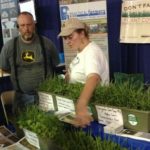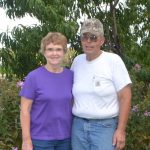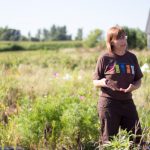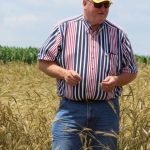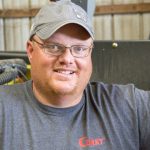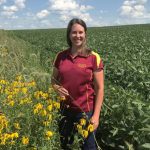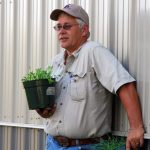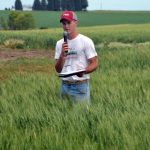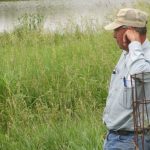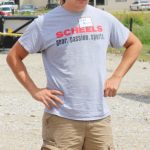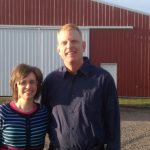Cover crop farmer experts available for Q&A at Farm Progress Show
For Release: August 16, 2018
Contacts:
Sarah Carlson | Strategic Initiatives Director | Practical Farmers of Iowa | (515) 232-5661 | sarah@practicalfarmers.org
Tamsyn Jones | Outreach & Publications Coordinator | Practical Farmers of Iowa | (515) 232-5661 | tamsyn@practicalfarmers.org
AMES, Iowa — Practical Farmers of Iowa invites farmers with questions about cover crops to stop by the Practical Farmers booth during this year’s Farm Progress Show, Aug. 28-30, in Boone. Cover crop farmer experts will be available each day, along with PFI staff, to answer a wide range of cover crop questions. Visitors to the booth can learn more about:
- cover crops as part of a conventional or organic corn-soybean system
- how cover crops can be used for livestock grazing, better manure handling and weed control
- how cover crops can be planted as part of a diversified system that includes small grains
- financial assistance through Practical Farmers’ cover crop cost-share program
Live potted cover crops will also be on display at the booth, along with a range of cover crop-related resources. Look for the Practical Farmers booth (number 9515) on the westernmost side of the Varied Industries Tent, in the Southwest Exhibit Field of the show grounds.
The following farmers will be on hand during the show, each with expertise in specific aspects of cover crops:
On Tuesday, Aug. 28, meet with:
Nathan Anderson, of Aurelia (northwest Iowa), from 8 a.m. to 12:30 p.m. Nathan and his family raise corn, soybeans, cattle, small grains and hay. They have been using cover crops for more than five years and can answer questions on:
- grazing cover crops
- aerial seeding of multi-species mixes
- making cover crops work with a corn-soybean rotation
Ruth and Robert Harvey, of Redfield (central Iowa), from 8 a.m. to 12:30 p.m. They have been using cover crops on more than 1,000 acres and can answer questions on:
- no-till and cover crops
- aerial-seeding cover crops
- planter setup for planting corn and soybeans into cover crops
Ann Franzenburg, of Van Horne (northeast Iowa), from 12:30-5 p.m. Ann and her family have a diversified farm that includes corn and soybeans; fruits and vegetables; cut flowers; and botanical crops. They have used cover crops since 2012, and can answer questions on:
- the benefits of cover crops in dry conditions
- how cover crops can help improve soil health
- using an extended crop rotation with corn, soybeans and milk thistle
On Wednesday, Aug. 29, meet with:
Mark Peterson, of Stanton (southwest Iowa), from 8 a.m. to 12:30 p.m. Mark and his wife, Melanie, raise corn, soybeans and small grains and have been using cover crops for 10 years. Mark can answer questions on:
- planning a spring nitrogen program for corn following a cereal rye cover crop
- drilling versus aerial-seeding cover crops with helicopters
- cover crop variety trial observations
Ward Van Dyke, of Reasnor (central Iowa), from 8 a.m. to 12:30 p.m. Ward raises primarily corn and soybeans, practicing no-till and reduced tillage and incorporating cover crops. He can answer questions on:
- cover crops for weed control
- working with ag retailers to seed cover crops with fertilizer application
- choosing the correct cover crop seeding rates to complement the following cash crop
Jack Boyer, of Reinbeck (northeast Iowa), from 10 a.m.to 12:30 p.m. Jack and his wife, Marion, grow seed corn, field corn, soybeans and some cover crop seed, and have been integrating cover crops for the past seven years. Jack can answer questions on:
- cover crops for weed control
- cover crop seed production
- how cover crops complement strip-tillage and no-tillage systems
Lisa Schulte Moore, of Ames (central Iowa), from 12:30-5 p.m. Lisa serves on PFI’s board of directors, and is a professor of natural resource ecology and management at Iowa State University. She and her husband also own part of Lisa’s family’s diversified farm in Wisconsin. Lisa can answer questions on:
- integrating prairie strips into row crop ground
Sam Bennett, of Galva (west-central Iowa), from 12:30-5 p.m. Sam farms with his wife, Danielle, father, brother and uncle raising corn, soybeans, rye and cover crops. He is sixth generation to care for his family’s century farm, and can answer questions on:
- the benefits of cover crops for soil health
- weed control in soybeans with rye
- cover crop establishment in no-till systems
On Thursday, Aug. 30, meet with:
Fred Abels, of Holland (northeast Iowa), from 8 a.m. to 12:30 p.m.Fred and his wife, Vicki, grow corn and soybeans, and operate a cow-calf operation. He can answer questions about:
- using high-clearance seeders to establish cover crops
- harvesting cover crop silage for cattle feed
- how cover crops improve water quality and soil health
Jeremy Gustafson, of Boone (central Iowa), from 8 a.m. to 12:30 p.m. He farms corn, soybeans and small grains close to the Farm Progress Show site and can answer questions on:
- using cover crops on heavy, wet soils
- summer cover crop mixtures
- planting soybeans into green rye
Paul Ackley, of Bedford (southwest Iowa), from 12:30-5 p.m. Paul and his wife, Nancy, raise corn, soybeans, wheat, cattle and hair sheep; all crops are produced using no-till and cover crops. He can answer questions on:
- how cover crops benefit soil health on his farm
- how to diversify the rotation to increase cover crop production
- how cattle and sheep integrate with cover crops
For more information on cover crops, or Practical Farmers of Iowa’s presence at the Farm Progress Show, contact Sarah Carlson at (515) 232-5661 or sarah@practicalfarmers.org.
###
Practical Farmers of Iowa works to equip farmers to build resilient farms and communities. Our values include: welcoming everyone; farmers leading the exchange of experience and knowledge; curiosity, creativity, collaboration and community; resilient farms now and for future generations; and stewardship of land and resources. To learn more, visit http://practicalfarmers.org.
- Jack Boyer, of Reinbeck, Iowa

